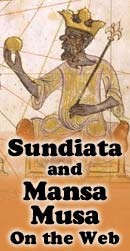Standards Controversy
What, there's controversy? Yes, there is. It's not really about Mansa Musa, but he's a convenient target. Personally—and when I say personally, let me add I worked for a major school publisher for four years—I think Ravitch is dead-on in her critiques how textbooks are put together. Mansa Musa is an interesting figure of African history, and—although almost all educational material about him seems detached from the scanty not unproblematic sources—worthy of study. Mansa Musa is not someone every fourth-grader needs to learn about. They need to learn about the Constitution. Besides, I think there's a deeper criticism. There is a subtle racism in the effort to promote African rulers and civilizations in so far as they conform to Western ideas of what a civilization "should" be. "Oh, now I hear Africans can write, oh they must be equal then!"
 Amazon. The Language Police : How Pressure Groups Restrict What Students Learn by Diane Ravitch. This is a good, serious book by an educator (contrast Buchanan). Here she is on
Mansa Musa
Amazon. The Language Police : How Pressure Groups Restrict What Students Learn by Diane Ravitch. This is a good, serious book by an educator (contrast Buchanan). Here she is on
Mansa Musa
"Distortions appear as texts create new heroic figures and omit inconvenient facts. In Call to Freedom and The American Journey, one learns of the glorious Mansa Musa, the Islamic ruler of Mali, who undertook a pilgrimate (hajj) to Mecca in 1324 with a grand retinue that included many thousnds of slaves. Neither texts explains why Mansa Musa should be considered a major figure in the history of the United States, which did not exist until 450 years after his fabled hajj."
Article by Lynne V. Cheney on the National Standards for United States History, Wall Street Journal (10/20/94). Search down.
"The general drift of the document becomes apparent when one realizes that not a single one of the 31 standards mentions the Constitution. True, it does come up in the 250 pages of supporting materials. It is even described as 'the culmination of the most creative era of constitutionalism in American history' — but only in the dependent clause of a sentence that has as its main point that students should "ponder the paradox that the Constitution sidetracked the movement to abolish slavery that had taken rise in the revolutionary era.' The authors tend to save their unqualified admiration for people, places and events that are politically correct. The first era, 'Three Worlds Meet (Beginnings to 1620),' covers societies in the Americas, Western Europe and West Africa that began to interact significantly after 1450. To understand West Africa, students are encouraged to "analyze the achievements and grandeur of Mansa Musa's court, and the social customs and wealth of the kingdom of Mali.'"
 Amazon. The Death of the West: How Dying Populations and Immigrant Invasions Imperil Our Country and Civilization by Patrick J. Buchanan. Buchanan attacks the National History Standards, and the
ever-present Mansa Musa, or the un-PC
observation that "Slaves, after all, were the leading cash crop of the friends of Mansa Musa."
Amazon. The Death of the West: How Dying Populations and Immigrant Invasions Imperil Our Country and Civilization by Patrick J. Buchanan. Buchanan attacks the National History Standards, and the
ever-present Mansa Musa, or the un-PC
observation that "Slaves, after all, were the leading cash crop of the friends of Mansa Musa."
"The New, Improved History Standards" by Diane Ravitch and Arthur Schlesinger Jr., Wall Street Journal (4/3/96).
"In response to the recommendations, the UCLA center recast the standards, removing every legitimate cause for complaint … Out went references to the grandeur of Mansa Musa and the fabled wealth of Mali …"
"After Mansa" editorial from the Washington Times. I haven't read it—payment required.

If you enjoy this site you may also like these other sites by me:
Ibn Battuta on the Web. Comprehensive guide to the 14th century Muslim traveler, Ibn Battuta on Morocco, and his Rihla.
Ibn Khaldun on the Web. Web directory and guide to the great 14th century Arab historian and philosopher of history.
